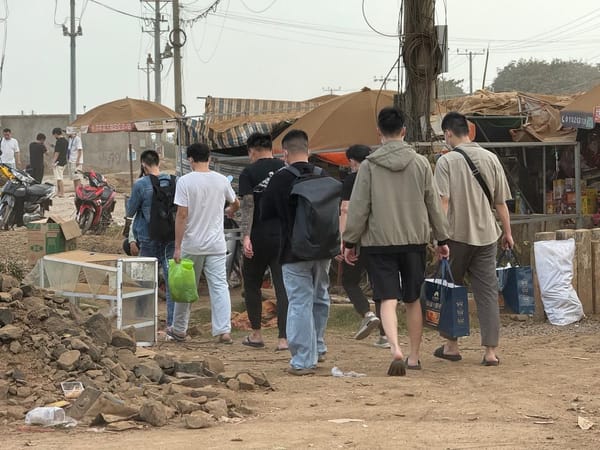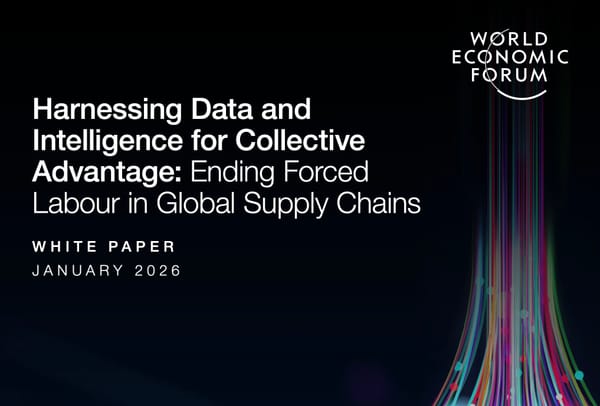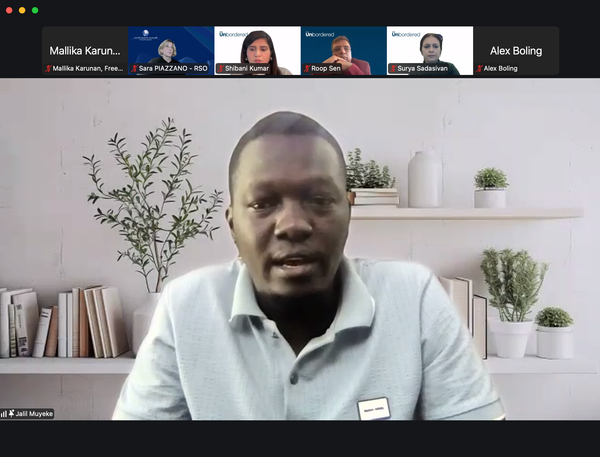Strengthening Cross-Sector Collaboration for Intelligence Sharing Helps Reduce Forced Criminality

Stakeholder partnerships have the potential to rapidly disrupt cyberscam operations, Dyson drops its libel case against a news investigation into alleged forced labour practices, and migrant workers in Italy are at risk from heatwaves.
With the crisis of trafficking for forced criminality into cyberscam centers in Southeast Asia rapidly worsening, the growing profitability of these operations continues to fuel an increased demand for labour, leading to a human trafficking crisis that reaches beyond Southeast Asia, involving victims from all over the world. While traditional protection approaches, such as freeing victims from compounds, remain essential, they are insufficient in preventing the crisis from further escalating. Within international law enforcement, there have been increasing efforts to target the financial structures that sustain criminal networks. Many countries are establishing specialized Scam and Fraud-focused law enforcement units and, building on other successful PPP (Public-Private Partnership) models such as JMLIT, are now utilizing these partnerships to bring together law enforcement and financial institutions to address cyber-enabled and other emerging crimes. However, what is needed to trigger investigations and actions is timely, actionable financial intelligence, which remains difficult to obtain.
Discussions have called for cross-sector collaborations and information-sharing partnerships between civil society organizations – who are in direct contact with victims – and financial crime experts. However, in practice, establishing these partnerships, and putting mechanisms in place has proven challenging, as they require trust to be built and processes to be established that are not yet in place.
If trust is built, however, the potential for effective collaboration is significant. This has been recently demonstrated by a member of our Forced Criminality Response Working Group who monitors Chinese social media for instances of cybercrime. The member identified information on a victim in Singapore who had fallen prey to a scam, transferring money to cyber criminals. Armed with transaction details and identification documents of the victim, the member reached out to another group member based in Singapore to see if the transaction could be intercepted. Financial institutions are not able to stop payments without a police order – a process that typically takes 24 to 48 hours. However, the Singapore-based member worked with Singapore law enforcement officers from the Anti Scam Command, who acted swiftly. Within a short period of time, the Singapore Police were able to contact the scam victim and protect a significant portion of the funds. Although some money had already reached the fraudsters, this rapid intervention significantly reduced the impact of the scam. By 8am the next day, the Singapore law enforcement officers sent a message of appreciation, which highlights the importance of timely and coordinated responses.
Our Forced Criminality Response Working Group, established in August 2023 and supported by USAID Cambodia CTIP and Winrock International, brings together 63 professionals from 11 countries – Thailand, Cambodia, Laos, Myanmar, Vietnam, Philippines, United States, India, Singapore, Bangladesh, and Uganda. Many members represent civil society organizations involved in case management and service provision, while others are professionals engaged in responding to different aspects of forced criminality, such as on-the-ground responders, legal advocates, policymakers, and financial crime experts. The diversity within the group provides access to a wide range of expertise, which is essential for developing alternative strategies. A high level of trust has been built among members, aided by a vetting process, whereby an existing member must propose prospective members, and regular monthly meetings which provide a forum for sharing information and updates, allowing members to become familiar with each other and appreciate their respective roles and areas of expertise.
The case example highlights the importance of rapid intervention in crime mitigation. The fact that the fraud target’s funds were frozen in such a short space of time significantly reduced the impact of the scam, illustrating how swift and coordinated efforts can directly limit the profits of criminal networks involved in human trafficking. It is hoped that such positive outcomes will set a precedent for future collaboration, reinforcing members’ confidence in sharing sensitive information with each other. In turn, this could enhance the collective capability to support complementary response strategies to prevent human trafficking by targeting its financial underpinnings.
Here’s a round-up of other noteworthy news and initiatives:
In his latest report to the UN General Assembly, the Special Rapporteur on contemporary forms of slavery, including its causes and consequences, considers the role of labour unions in protecting workers from modern slavery. A variety of encouraging practices on the part of workers’ organizations all over the world, as well as challenges experienced by both organizations and individuals to effectively exercise trade union rights and prevent contemporary forms of slavery, are also highlighted.
This report from the Danish Institute for International Studies explores the complex links between climate change, migration, and gender dynamics in Nepal, finding that, when men migrate to find work, their female partners become more vulnerable to environmental risks, and take on sole responsibility for keeping their families safe. They also face social stigma within their communities, and are constrained by strict gendered norms about where women can go without a male companion.
Home appliances manufacturer Dyson has abandoned its libel case against the UK’s Channel 4 News. The broadcaster had revealed that a group of migrant workers, recruited by Dyson’s contractor ATA IMS Bhd, were taking legal action alleging exploitative working and living conditions – Dyson denied the claims until a 2021 audit revealed serious abuses at the factory. Twenty-three former migrant workers continue to fight for compensation from Dyson, which denies any liability.
The Philippines Government has filed money-laundering complaints against 34 people, including former mayor Alice Guo, saying they “intended to create layers and layers of corporations to make it appear that they were engaged in profitable and legitimate businesses”, in a case linked to scam centers hidden within offshore gaming operator hubs.
An Indian migrant worker is believed to have died from a combination of extreme summer heat and a heavy workload on a flower farm in central Italy last month. Tens of thousands of migrants pick tomatoes and other crops across the country, often under conditions of forced labour, despite consecutive heatwaves since the middle of June. In July, Italian police described more than two dozen Indian migrants they rescued from a farm as having been “reduced to slavery” through debts, the confiscation of their passports, and dilapidated housing.
New data from U.S. Citizenship and Immigration Services (USCIS) shows that it approved 1,010 T visas – given to noncitizens who are or have been victims of a severe form of trafficking in persons – in recent months, bringing the total for the 2024 financial year to 2,660 approvals. This is the highest number of T visa approvals in history, USCIS says.
This factsheet published by the International Labour Organization (ILO) provides background information on the fishing industry and some of the inherent challenges of work in fishing. It aims to help professionals interested in this issue raise their understanding on the specific decent work deficits in this industry and the peculiarities of forced labour in fishing. A second factsheet is intended to support journalists and communicators interested in developing stories addressing decent work deficits in the commercial fishing industry and the broader value chain.
The Child Rights International Network (CRIN) is looking for a Legal, Policy and Advocacy Adviser to lead its work on national security and armed conflict, providing leadership on the way in which children’s rights are impacted by counter-terrorism measures, including work on UK-based and international campaigning.




